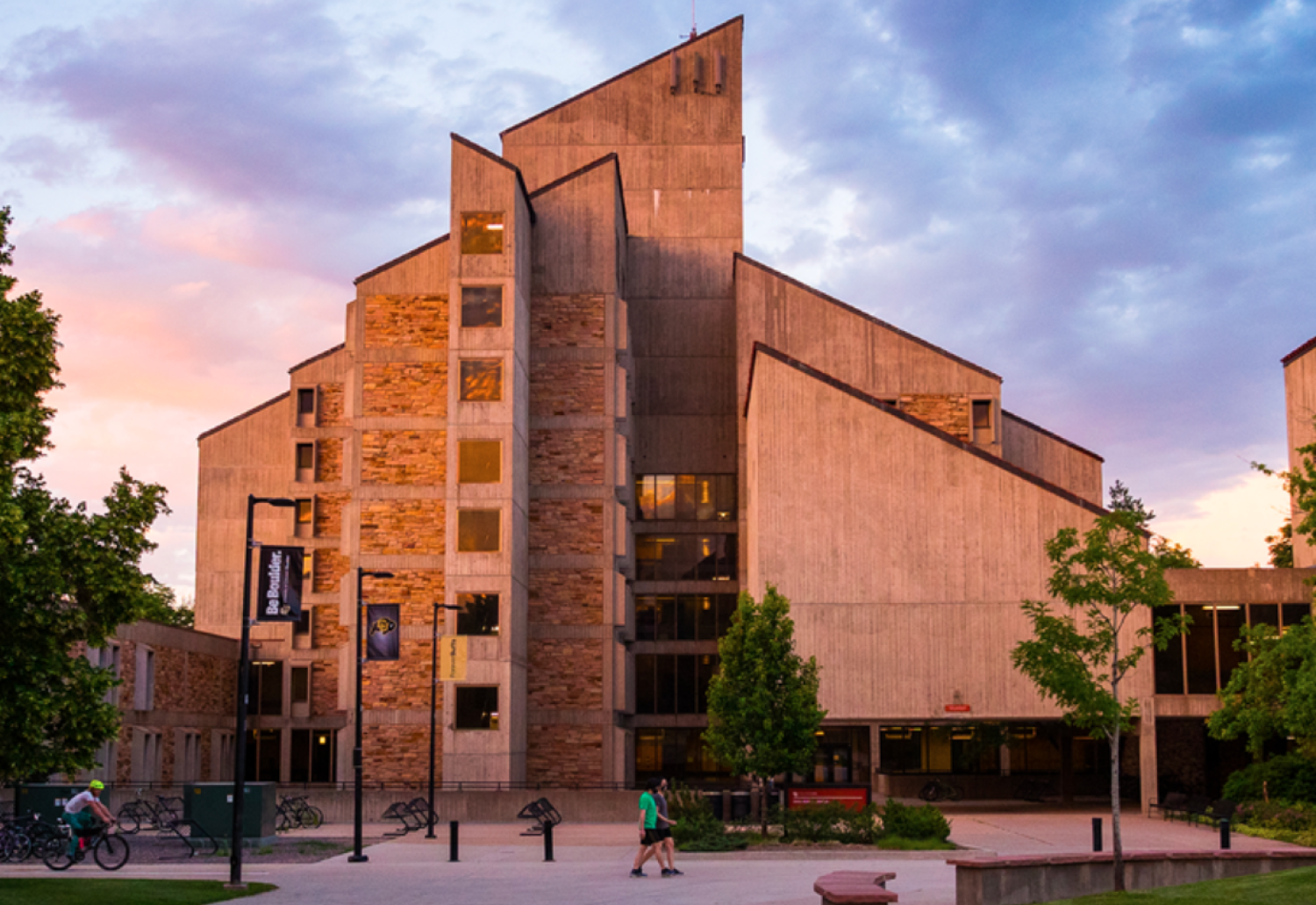Electrical, Computer & Energy Engineering Department News - September 16, 2024

We welcome your submissions for our weekly newsletter for faculty, staff, and graduate students. Please send a brief paragraph with what you'd like included to Carolanne Ayers before noon on Thursday to be included in the following week's newsletter!
Department News

Department Meeting - Thursday, Sept. 19, 11 a.m.
This week's department meeting will include the following:
- Information items
- Science Talk: David Beeman - Realistic Modeling of Neurons and Cortical Circuits in the Brain
- Main Discussion: Andreas Gyenis Comprehensive Review Discussion
- Lunch provided: Indian food

Faculty Announcements
- The 2025 Prospective PhD Visit Weekend will take place Thursday, February 20 - Saturday, February 22.
- Main Office Renovation/Relocation Workgroup
- Faculty members – if you are interested in helping to develop a proposal for either relocating the main office to the First Floor or renovating its current location, please contact Robin McClanahan. The proposal will take several months to complete and must include input from stakeholders.
- Hotel Space: The former associate chair office, 1B55A, in the ECEE main office, has been repurposed as a hotel space. The room features a large desk, a large round table and 4 chairs, a desktop monitor, and a large wall-mounted monitor/TV. The room is unlocked and is available on first come, first served basis. Contact Robin McClanahan with any questions.
- Dissertations Available: The Graduate School has decided that all thesis/dissertations that have been digitized and stored in CU Scholar/ProQuest meet retention requirements and there’s no need to keep physical copies of these documents in the department any longer. The digitized thesis/dissertations have been identified and separated from the non-digitized. They are now available for faculty and students to look through and select any that they would like to have for their offices or labs. Please stop by the main office anytime through September 30 to make selections. Contact Robin McClanahan with any questions.
Student News
- Seeking representatives: College of Engineering & Applied Science Graduate Student Advisory
- The purpose of the Graduate Student Advisory Board (GSAB) is to act as an advisory body to the College of Engineering and Applied Science (CEAS) administration through:
- 1. Building and representing graduate student community;
- 2. Advocating for resources at the graduate level
- 3. Strengthening collaborative relationships between the graduate student community, CEAS faculty and administrators
- The purpose of the Graduate Student Advisory Board (GSAB) is to act as an advisory body to the College of Engineering and Applied Science (CEAS) administration through:
- Graduate student advisory committee for AI in Education and Research
- We're seeking graduate students to join the Graduate Student Advisory Committee on AI in Education and Research. This is a unique opportunity to help shape AI guidelines within the College of Engineering and Applied Sciences.
- Committee members will gather input from peers and collaborate with faculty and leadership to develop policies for responsible AI use in education and research.
- We encourage applications from students with AI experience who are passionate about its ethical use. Apply now!
- PhD Students Master's Along the Way:
- If you would like to receive your Master’s degree along the way toward your PhD, the time is open for Fall 2024. This generally means you have completed all coursework requirements toward your PhD (30 credits).
- **The transfer credit rules are different for Master’s vs PhD, so you can only have transferred in a maximum of 9 credits, with 21 completed at CU to receive the Master’s along the way. If those 9 credits were used to complete a previous master's degree, they do not count toward a master's along the way.
- Please Lori know if you would like to be included by Wednesday, September 18, so I can submit a form to have an “MS” degree track added to your Buff Portal. When that is complete, you will need to apply to graduate as an MS student for Fall 2024 (directions can be found here) and complete a Candidacy App for an Advanced Degree.
The deadline to apply to graduate with a master’s and to submit the Candidacy App is October 1.
Master's Students Graduation:
- If you are planning to graduate this Fall, see the important deadlines here, as well as the Graduation document on the ECEE Graduate Student Information Canvas page in the "Current Master's Student" section.
- Sept. 4, 2024: Preferred deadline to submit the Candidacy Application for an Advanced Degree to the Graduate School. Approval by your academic department is required.
- Oct. 1, 2024: Final deadline to submit the Candidacy Application and apply for December graduation via Buff Portal.
- Nov. 21, 2024: Deadline to defend your thesis if applicable.
- If you are planning to graduate this Fall, see the important deadlines here, as well as the Graduation document on the ECEE Graduate Student Information Canvas page in the "Current Master's Student" section.
Upcoming Student Events
Individual Development Plans: Enhance Your Career Potential
Please join us for an upcoming virtual workshop for graduate students and postdocs to learn how to create and utilize IDPs: Individual Development Plans: Enhance Your Career Potential on Sept. 18, 2024 from 1 – 2:30 p.m. via zoom.
- Discover the potential of Individual Development Plans (IDPs) to shape your career trajectory and unlock your professional growth. Postdocs and graduate students are invited to learn how to set effective career goals and track their development using IDPs. The webinar will feature a presentation led by Pallavi Eswara, Director of Postdoctoral Affairs at Boston University, followed by a hands-on breakout session where you can begin crafting your own IDP. IDP resources can be referenced here in advance of the session. The Zoom link will be emailed to registrants the day of the webinar. Register by clicking “I’m Interested” on this link.
- An Individual Development Plan (IDP) is a personalized, strategic tool that helps individuals, particularly graduate students and early-career professionals, set short- and long-term goals for their personal and professional growth. IDPs typically outline specific objectives, skills to develop, and actionable steps to achieve career aspirations, while considering feedback from mentors or supervisors. IDPs are important because they promote self-assessment, help align career aspirations with academic or professional development and ensure accountability. By identifying clear goals and tracking progress, IDPs enable individuals to proactively manage their career trajectory and build the skills necessary for future success.
- National Institutes of Health (NIH) and National Science Foundation (NSF) IDP Requirements: In 2013, the NIH recommended that IDPs be used for all graduate students and postdoctoral researchers supported by NIH funding. The NIH requires institutions to report on how they are using IDPs in progress reports for training grants. As of May 2024, the National Science Foundation (NSF) now requires that graduate students and postdoctoral scholars use an IDP if they receive at least one month or more of support from an NSF award. The IDP must be updated annually and includes: career exploration, educational goals, and professional development. The IDP must be certified by the PI or Co-PI in the annual and final reports. The IDP does not need to be submitted to the NSF, but it can be requested at any time. A main goal of this mentoring requirement is to enhance career preparation and professional growth, ensuring researchers gain valuable skills both inside and outside of academia.
Guest Lecturer Dr. Angela Neal-Barnett - October 16th at 4:30 p.m.
Ever feel like you're the "only" one? Join us on October 16 from 4:30 p.m. to 5:30 p.m. at the CASE Auditorium for a vital discussion led by Dr. Angela Neal-Barnett, renowned Professor of Psychology of Kent State University and author of "Soothe Your Nerves." All are welcome.
- Learn how to manage anxiety and enhance your leadership as an "only" at CU Boulder. This session is a must for anyone looking to bring their whole self to their academic and professional environments, supported by insights from an award-winning expert.
- Faculty/Staff Reception to Follow, Email CDI@colorado.edu if interested.
- https://cuboulder.qualtrics.com/jfe/form/SV_5p7Mn1n9v0XmaRE
GradSWE
Interested in building community with women & non-binary folks in graduate school? Join the Graduate Society of Women Engineers (GradSWE)! GradSWE is an inclusive community, committed to supporting women and other minorities, and is open to all who support these groups in STEM. GradSWE offers community outreach, professional development, and social events throughout the semester. Additionally, with GradSWE there are opportunities to attend regional and national conferences, including WE Local and WE National. If you’re interested, you can join the GradSWE newsletter HERE and our Slack HERE to get more information about future events! Further, please feel free to reach out to me (kylie.boenischoakes@colorado.edu) or Mackenzie Bowden, Chair (mackenzie.bowden@colorado.edu) if you have any questions!
IT News
Secure Computing Quick Start Guide
OIT has developed a Secure Computing Quick Start Guide that will be included with each new Dell and Mac computer purchased through the CU Marketplace starting in August. The Quick Start Guides provide best practices and a link to step-by-step instructions for the initial set-up of new Windows and Mac computers. The Quick Start Guide will be reflected as an SKU in the invoice. This will add a $7.50 charge to Apple computers ordered through CDW and a $5 to $7 charge to Dell computers, based on the computer’s specifications. This cost will be reimbursed by OIT per speedtype on a quarterly basis for orders placed during the 2024-25 fiscal year. After this fiscal year, covering the Quick Start Guide cost will be the responsibility of ordering departments and will no longer be reimbursed by OIT. For more information: https://oit.colorado.edu/software-hardware/secure-computing.
Research License Server: ecee-flexlm-2.colorado.edu
OIT has sunset its Linux server support and outsourced it to a 3rd party: Crazy Penguins. There is a $30 monthly charge for this “proactive” (monthly updates, and patching security vulnerabilities) service and a $150 cost for “reactive” service (questions, requests, etc.). The ECEE department will cover these costs. If you need to contact Crazy Penguins, submit a request to: support@craftypenguins.net.
Email Security Service
OIT is implementing a new email security service, Abnormal Security, which uses advanced detection models to protect against email attacks that exploit human behavior such as phishing, social engineering and account takeovers. The service will be rolled out to CU Boulder email accounts the week of August 12.
Abnormal Security will run in parallel with our Microsoft Defender Quarantine service to help detect whether incoming emails are malicious or harmless. Abnormal Security brings greater scrutiny and nuance to phishing detection, catching phish that Microsoft Defender may miss. Abnormal Security only reviews emails that Microsoft Defender identifies as being safe. If Abnormal Security identifies the email as malicious, the email is blocked. This will save you time from having to review and report suspicious emails in addition to protecting your data and identity.
The addition of Abnormal Security to our email environment is in direct response to campus feedback about the desire for improved email security that requires minimal user input. According to the Verizon 2023 Data Breach Report, phishing is the second leading way for organizations to be breached. According to Station X, phishing is the number one cybercrime, with 3.4 billion attempts sent annually. Abnormal Security adds another layer of security to help keep our campus data and resources safe.
IT Support
- Teaching Labs (Capstone, Embedded Systems, Power Lab, Optics, RF, Highspeed Measurements, Circuits) IT Support: http://itll.link/servicedesk
- Research Labs License Server Support: support@craftypenguins.net
- OIT Website https://oit.colorado.edu/support
- Research Computing: https://www.colorado.edu/rc/
- IT Service Center: Contact the IT Service Center (303-735-4357 or help@colorado.edu) for help with all OIT services including email and IdentiKey, Internet connectivity and other technology-related questions.
- Buff Techs Desktop Support: OIT provides no-cost software support for laptop and desktop workstations to faculty, staff, and students. You can also register your laptop to aid in recovery in case it is lost or stolen.
- Dedicated Desktop Support: Departmental IT Support customized for your needs.
- Network Troubleshooting: Submit this form to report network connectivity issues on campus.
- Classroom Technology Problem Reporting form: Submit this form to report an issue with technology malfunctioning in a classroom (except for the ECEE classrooms – contact Bret.Moreland@colorado or 303-503-7939 for support)
- Self-Service Help Request: Submit a request directly to the ITSC using ServiceNow
- Lightboard: Contact Andy Garcia, Andrew.Garcia-3@colorado.edu, in the Mechanical Engineering department for scheduling and technical assistance
- All other issues, contact Robin.McClanahan@colorado.edu or 303-492-6736.

